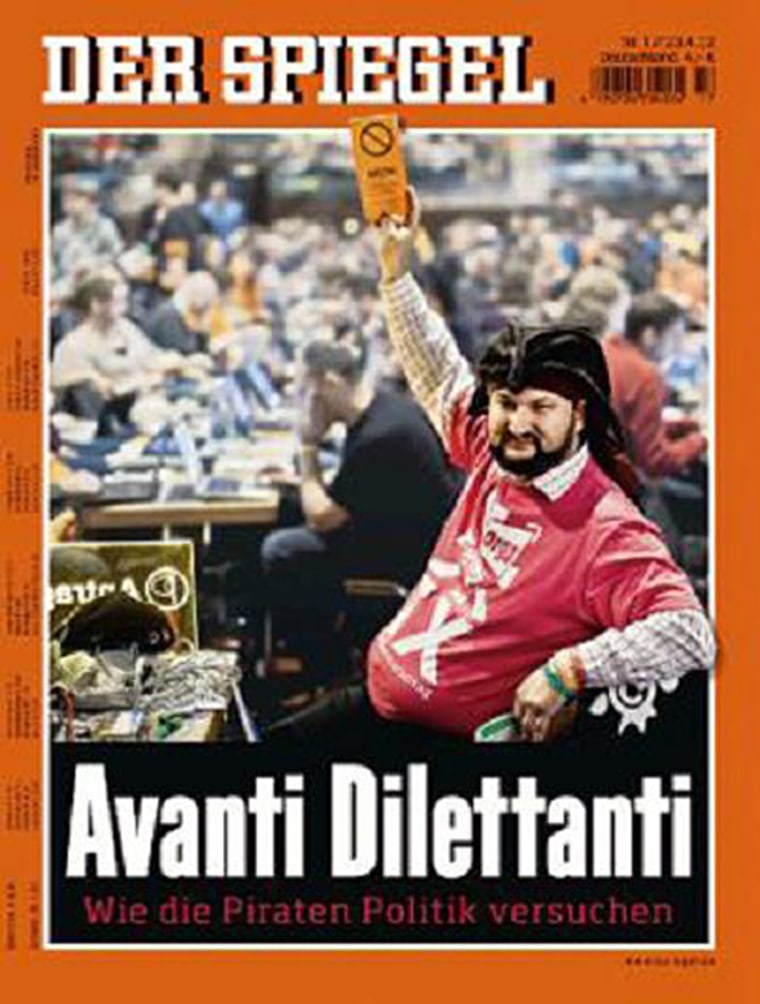MAINZ, Germany -- The Pirate Party boarded another ship this week, so to speak, as the upstarts' voyage into German politics startled mainstream rivals.
Their treasure? Nearly 8 percent of the votes in a local election in the country's most populous state and their fourth consecutive entry into a German local state parliament.
"We have written history today, now it is time to party, politics should be fun," said Michele Marsching, head of the local state chapter in Northrhein-Westphalia.
The Pirate Party has based its political agenda mainly on Internet freedom and political transparency. It promotes what it calls "liquid feedback," which involves members making suggestions online. They are discussed in chat rooms before entering the party's internal policy-making process.
Despite, or perhaps because of this unconventional approach, the Pirate Party surprised the country's long-established parties by gaining a reputable 7.8 percent of the vote on Sunday. Meanwhile, Chancellor Angela Merkel's party – the Christian Democrats – had to cope with a huge defeat in Northrhein-Westphalia.
'Learning by doing'
But who are the Pirates? A mostly young motley crew of hip intellectuals and bandana-wearing cyber-politicians, they have openly admitted that they are still "learning by doing" after every new election success.
The Pirates emerged in Sweden six years ago, where they started by campaigning on free downloads for personal use and Internet privacy issues. Germany's Pirate Party now has approximately 30,000 members.
"The party consists of mostly liberal leftists, who have some typical socialist views. But most important is that they promote a new form of politics," Professor Jürgen Falter, a political scientist at the University of Mainz, told NBC News.
Falter says that he has spent hours combing through the Pirates' program, but admits that he had difficulties finding a clear political line in their manifesto.
"Some of the propositions would even require a fundamental change of German laws and a total rethinking of existing party oligarchies," Falter said.
A retired teacher's courageous crusade: Tackling neo-Nazi hate
In fact, some political demands seem rather anarchical: the Pirates are calling for ticket-free public transportation in German cities, funded (as one of many online proposals suggested by members) by tax money. Another demand is the basic income guarantee for all Germans.
However, the party still has difficulties explaining how these projects would be paid for.
'No defined finish line'
What happens, for example, if a foreign tourist needs a bus ticket? No answer yet -- decision-making in progress, the Pirates say.
"Political experts always ask when we are ready to present our program, when we can define all of our goals," says 31-year-old Markus Barenhoff, the deputy chairman of the Pirate Party. "But for us, there is no defined finish line, politics and political decisions are a continuing development process."
Germany's influential Der Spiegel weekly news magazine recently dedicated its cover to Germany's fledgling party and described the young politicians as "amateurs," calling the Pirates' political quest a "grand experiment."

Der Spiegel's article portrayed the Pirates as "a party of computer nerds and freaks, a party of political neophytes, electrifying a large share of German citizens."
The Pirates' popularity seems to be the result of a growing political mistrust and disappointment with traditional politicians.
Many analysts in Germany say the Pirates are drawing support from across the political spectrum due to a growing "disenchantment with politics" across Europe.
"Thanks to their fresh anti-establishment attitude they are attracting many new voters, who in the past stayed away from the polls," Falter added. "But they also capture the so-called protest votes, people who are frustrated with conventional politics.
"The Pirates are somewhat naive politicians, but they are democrats, and their success is far better than seeing gains for extremist parties from the Far Left or the Far Right."
3 arrested as Germany cracks down on neo-Nazi extremists
The Pirates' fairytale is reminiscent of the rise of Germany's Green party, which was regarded as little more than a group of radical ecologists when the party appeared on the political landscape 30 years ago. Today, the Greens are a respected "political pillar" and have been part of ruling coalitions.
But while the Greens had a clear political message from the start, the Pirates are still in search of their exact stand on important issues such as the eurozone crisis or defense and security policies.
"We are truly different," says Barenhoff, an IT specialist. "Our focus is set more on political methods than on political content."

If the Pirates do manage to become a permanent player in German parliaments, they could make it tougher for the country's large parties to form majorities. A federal election looms in September 2013.
The Pirates are cautious about whether their current success is sustainable and if it will allow them to gain seats in the Bundestag, Germany's lower house of parliament, next year.
"I believe that we have very good chances to enter the German parliament in 2013, but knowing how rapid things can change in politics, I do not want to give a prognosis for the long term," says Barenhoff. "We are working on the here and now."
More world news from msnbc.com and NBC News:
- Germany's Pirate Party rides wave of popularity
- 'Scapegoated'? Westerners held over massacre
- Anxious Greeks withdraw $894 million in a day
- In China, English teaching is a whites-only club
- Beer-swilling bride sparks controversy in New Zealand
- Oh la la! A look at France's fascinating first ladies
- 'Puppet': Al-Qaida chief issues message on Yemen
- 'Everything has doubled in price': Iran sanctions bite
Follow us on Twitter: @msnbc_world